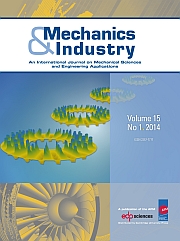Article contents
Diagnosis of faults in the bearings by electrical measures andnumerical simulations
Published online by Cambridge University Press: 05 September 2014
Abstract
This project represents a straight continuation of the research activities of the LTI andwhich helped to simulate and understand the electrical response of multi-contact systems.In order to make further progress in the electrical modeling, the electrical transfermodel is applied to the case of bearing operation. The 2D modeling by discrete elementsreproduces the dynamic bearing. The method proposes to take measurements of electricalresistance on bearings to detect defects. This is an original method that stems from workpublished in MSSP. Indeed, while many studies have been conducted on monitoring bearingdefects by analyzing vibration signals, the use of localized electrical measurements onbearings is a promising approach, not yet exploited. The introduction of the firstdefects, as a local breaking of mechanical contact causes periodic disturbances in thecalculation of the electrical resistance. One of our objectives is to characterize thedefects position and the size of the defects, by analyzing disturbances in the electricalmeasurement.
- Type
- Research Article
- Information
- Copyright
- © AFM, EDP Sciences 2014
References
- 9
- Cited by


